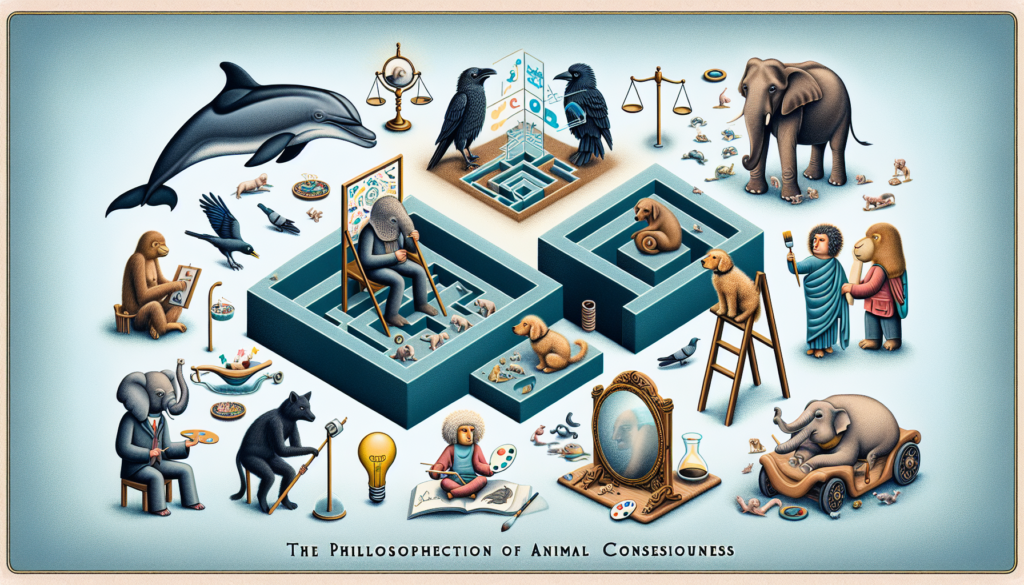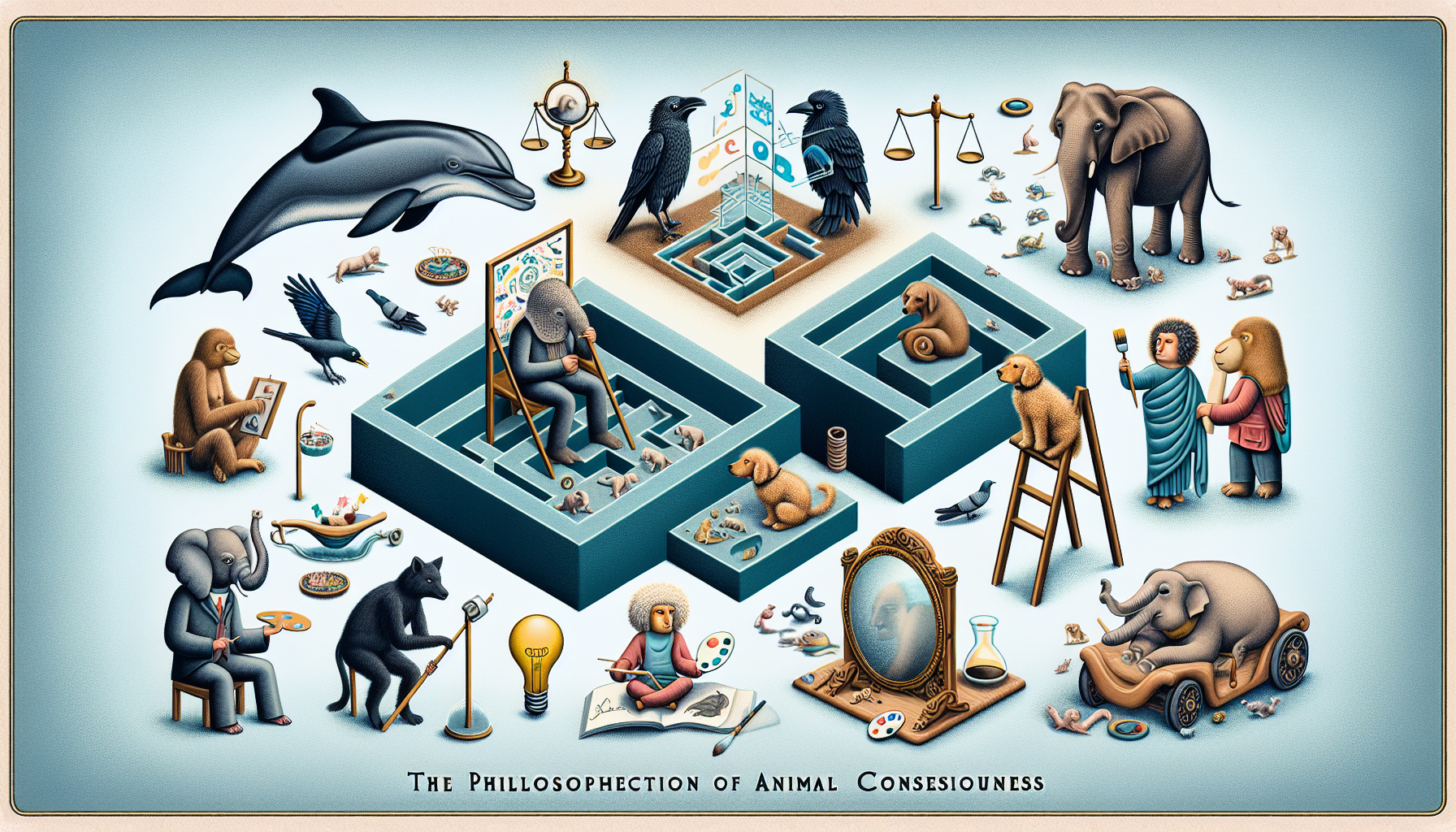Imagine a world where animals possess a level of consciousness that is not only rudimentary but also on par with human beings. Picture a reality where they possess the ability to think, feel emotions, and even have a sense of self. This fascinating exploration into the philosophical implications of animal consciousness delves into the potential ethical and moral dilemmas that arise from acknowledging their inner lives. Brace yourself for a thought-provoking journey that challenges our long-held assumptions about the nature of consciousness and our place in the world.
The Definition of Animal Consciousness
Animal consciousness refers to the awareness and subjective experience of non-human animals. It involves their ability to have subjective mental states and experiences, similar to how humans experience the world. While it is difficult to definitively define and measure animal consciousness, there is a growing body of evidence suggesting that animals possess varying degrees of consciousness. Understanding this concept is essential for addressing ethical considerations, such as the treatment of animals and the impact of human activities on their well-being.
The Varieties of Animal Consciousness
Animal consciousness encompasses a wide range of cognitive abilities and experiences. Different species exhibit varying levels of consciousness, which may include self-awareness, perception, emotions, and certain cognitive processes. For instance, studies have shown that mammals, such as dogs and chimpanzees, display cognitive abilities and emotions that are indicative of consciousness. Similarly, birds have demonstrated problem-solving skills and complex social behaviors, suggesting a certain level of consciousness. It is important to recognize that consciousness is not limited to mammals, but can be found across various animal taxa.
The Criteria for Determining Animal Consciousness
Determining animal consciousness poses challenges, as we cannot directly observe their subjective experiences. However, scientists and researchers have developed criteria and methods to assess consciousness in animals. These criteria include self-awareness tests, such as mirror self-recognition tests, which assess if an animal recognizes itself in a mirror. Behavioral observations and neuroscientific approaches, such as brain imaging techniques, also aid in understanding the neural correlates of consciousness in animals. These criteria help us gain insights into the existence and extent of consciousness in different species.
Anthropocentrism and the Domination Paradigm
The Historical Context of Anthropocentrism
Anthropocentrism is a worldview that places humans at the center of the universe, considering them superior to all other species. This perspective has its roots in religious and philosophical traditions that emphasize human exceptionalism. Throughout history, anthropocentrism has influenced human attitudes towards animals, leading to their exploitation and mistreatment. The dominance of anthropocentrism often disregards the intrinsic value and rights of non-human animals, solely focusing on human interests.
The Domination Paradigm and Animal Exploitation
The domination paradigm, closely related to anthropocentrism, perpetuates the belief that humans have the right to use and control animals for their own purposes. This paradigm has profound implications for animal exploitation across various industries, such as factory farming, animal testing, and entertainment. Animals are often treated as mere commodities, subjected to confinement, physical harm, and psychological distress. Recognizing and challenging this paradigm is essential for addressing the ethical concerns surrounding animal consciousness and promoting a more compassionate and respectful approach towards animals.

Ethical Considerations of Animal Consciousness
The Moral Status of Animals
The question of the moral status of animals arises when considering their consciousness. Various ethical theories, such as utilitarianism and rights-based approaches, offer different perspectives on the moral consideration of animals. Utilitarianism focuses on maximizing overall well-being and minimizing suffering, arguing that animals’ capacity to experience pleasure and pain warrants moral consideration. Rights-based approaches, on the other hand, emphasize the inherent rights of animals, regardless of their cognitive abilities. Recognizing the moral status of animals is crucial for evaluating our ethical obligations towards them.
Sentience and Moral Consideration
Sentience, the capacity to have subjective experiences, is closely linked to animal consciousness. Animals that possess consciousness are also considered sentient beings. Sentience entails the ability to feel pleasure, pain, emotions, and other subjective states. Granting moral consideration to sentient beings acknowledges their inherent value and the importance of minimizing their suffering. This understanding places an ethical responsibility on humans to protect and care for animals, ensuring their well-being and avoiding unnecessary harm.
The Problem of Animal Suffering
The Existence of Animal Suffering
The recognition of animal consciousness raises concerns about the widespread suffering endured by animals in various settings. Factory farming, for example, subjects animals to overcrowded and stressful conditions, causing immense physical and psychological suffering. Animals used in experiments also experience significant distress and pain. Recognizing and addressing animal suffering is essential not only for ethical reasons but also for considering the impact on public health, the environment, and human values.
The Implications for Ethics and Policy Making
Animal suffering has far-reaching implications for ethical considerations and policy-making. It calls for the implementation of regulations and standards to ensure the welfare of animals across different industries. Ethical frameworks, such as animal rights and welfare approaches, emphasize the need to minimize suffering and provide suitable living conditions for animals. Policies and initiatives that promote alternatives to animal testing, encourage sustainable farming practices, and prohibit cruel treatment are vital steps in addressing the problem of animal suffering.

The Evolutionary Perspective
The Evolution of Consciousness
Understanding the evolution of consciousness provides insights into the development of animal consciousness. While the exact origins of consciousness remain a subject of scientific investigation, it is believed to have emerged gradually in evolutionary history. The presence of consciousness in different species suggests that it serves adaptive functions, aiding in survival and social interactions. By exploring the evolutionary perspective, we gain a deeper appreciation for the interconnectedness of all species and the value of animal consciousness.
The Implications for Human-Animal Relationships
Recognizing animal consciousness has profound implications for human-animal relationships. It challenges the traditional perception of animals as mere resources or ornaments and calls for a more respectful and compassionate approach. Viewing animals as conscious beings highlights the importance of empathy, ethical treatment, and fostering harmonious coexistence. Such a shift in perspective encourages the development of mutually beneficial relationships, where humans appreciate and preserve the well-being and rights of animals.
Animal Consciousness and Personal Identity
The Continuity of Consciousness
Exploring animal consciousness raises questions about the continuity of consciousness between humans and animals. While there may be qualitative and quantitative differences in consciousness among species, the presence of consciousness in animals suggests a fundamental similarity. This continuity challenges the notion that humans are the only beings with a unique and privileged form of consciousness. Acknowledging the shared experiences of consciousness promotes inclusivity and extends our understanding of personal identity beyond human boundaries.
Extending Personhood to Nonhuman Animals
The recognition of animal consciousness invites a reevaluation of the concept of personhood. Personhood typically refers to the moral and legal rights granted to individuals based on their cognitive capacities. Extending personhood to nonhuman animals takes into account their consciousness and the ability to experience life subjectively. This extension challenges the anthropocentric view of personhood and emphasizes the necessity of recognizing the moral rights and inherent value of all beings capable of consciousness.
Cultural and Religious Perspectives
Animal Consciousness in Indigenous Cultures
Indigenous cultures have long recognized the consciousness and value of animals. Traditional ecological knowledge emphasizes the interconnection between humans, animals, and the environment. Indigenous communities often integrate animals into their belief systems, respecting and coexisting with them. Their cultural perspectives offer valuable insights into the recognition and preservation of animal consciousness. Learning from these cultures can enrich our understanding of the importance of animal consciousness in shaping our relationship with the natural world.
Religious Views on Animal Consciousness
Religious traditions also provide diverse perspectives on animal consciousness. Some religious teachings emphasize the stewardship of animals and the ethical responsibility to protect their well-being. Others view animals as divine creations deserving reverence and care. Recognizing animal consciousness within religious frameworks expands our ethical considerations and encourages the integration of compassionate practices towards animals. These perspectives can prompt dialogue and advocacy for animal rights and welfare within religious communities.
Scientific Methods for Studying Animal Consciousness
Behavioral Observations
Behavioral observations play a crucial role in studying animal consciousness. Researchers closely observe and analyze the behaviors exhibited by animals to gain insights into their cognitive capacities and subjective experiences. For example, researchers conduct studies to assess social behaviors, problem-solving abilities, and responses to stimuli. By systematically observing these behaviors, scientists can gather evidence supporting the presence and extent of consciousness in different animal species.
Neuroscientific Approaches
Neuroscientific approaches provide another avenue for understanding animal consciousness. Methods such as functional magnetic resonance imaging (fMRI) and electroencephalography (EEG) allow researchers to observe neural activity and identify the neural correlates of consciousness. These techniques provide insights into the brain structures and processes associated with conscious experiences in animals. Combining behavioral observations with neuroscientific approaches enables a multidimensional approach to studying animal consciousness and its underlying mechanisms.
Cross-Species Communication and Cognition
Animal Communication Systems
Cross-species communication refers to the exchange of information and signals between different species. Animals employ various communication systems, including vocalizations, body language, and chemical signals, to convey messages and interact with their environment and conspecifics. Studying animal communication systems offers valuable insights into their cognitive abilities and the depth of their consciousness. It reveals the complexity of animal social interactions and the importance of understanding communication as a fundamental aspect of consciousness.
Cognitive Abilities in Nonhuman Species
Investigating the cognitive abilities of nonhuman species further supports the existence of animal consciousness. Animals demonstrate remarkable cognitive skills, such as problem-solving, tool use, and memory. Studies on the intelligence of chimpanzees, dolphins, and elephants, for instance, unveil their sophisticated cognitive abilities. These findings suggest that animals possess consciousness and exhibit higher-level cognitive processes. Understanding the extent and diversity of cognitive abilities in nonhuman species contributes to our understanding of animal consciousness and broadens our perspectives on intelligence.
Implications for Animal Rights and Welfare
Legal Protections for Animals
The recognition of animal consciousness has implications for animal rights and welfare, including legal protections. Governments and international bodies have implemented legislation to safeguard animals from cruelty and exploitation. Recognizing the sentience and consciousness of animals bolsters the argument for stronger legal protections. Laws aimed at preventing animal abuse, promoting ethical treatment, and banning certain practices align with the understanding that animals have subjective experiences and deserve respect and care.
Implementing Ethical Principles in Animal Industries
Understanding animal consciousness calls for a reevaluation of practices in animal industries. Reforming industries involved in factory farming, animal testing, and entertainment becomes crucial to prioritize animal welfare and minimize suffering. Ethical principles, such as the Five Freedoms (freedom from hunger, discomfort, pain, fear, and distress), provide a framework for implementing humane practices. Promoting alternatives to animal testing, advocating for sustainable farming methods, and informing consumers about ethical choices are steps towards building a more compassionate and responsible society.
In conclusion, the recognition and understanding of animal consciousness have significant philosophical implications. It challenges anthropocentrism, highlights ethical considerations, raises questions about personal identity, and influences our relationships with animals. By employing scientific methods and studying cross-species communication and cognition, we can gain insights into animal consciousness and its evolutionary origins. Incorporating cultural, religious, and indigenous perspectives enriches our appreciation for the interconnectedness of all beings. Ultimately, recognizing animal consciousness necessitates promoting animal rights, implementing legal protections, and practicing ethical principles in our interactions with animals.

